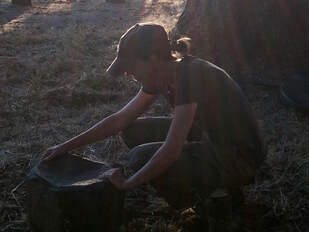 — by Molly Sirois Two weeks before my 80 year-old friend died, she had a stroke. She was well-prepared for such an event, having lived with multiple sclerosis for 56 years. Her POLST form was on the front door, her advance directive completed, and her end-of-life affairs in order. Her friends and family knew she didn’t want any life-sustaining intervention, no food, no water. Not even hospice. Several of us had experience caring for others in their last days, and combined with her doctor’s consultation, we knew what to do: make her as comfortable as possible. The mortuary was on notice. It was 1:20 am when she breathed out for the last time. The two of us who’d been her primary caregivers cleaned and dressed her body and then called the mortuary. All was tranquil in her home… until the rapping on the door. Two police officers strode inside and said they’d come to “investigate a death.” With that, the natural death of my friend was cast as a possible crime and we (her caregivers) the suspects. Questions were fired off at me: Name? Address? Relationship to the deceased? What medications did you give her? When? How much? I stopped answering at some point, and fired off my own question. Why are you here? A 911 call had been placed about a death and they had to investigate. They said they were going to examine the body for indications of violence: “pooling of blood, marks around the neck, bruising.” They even had a camera. By this time, I was enraged. The other caregiver ushered me into the kitchen to calm down. After examining my friend’s body, the police left, but not without marring an otherwise beautiful death. What I’ve since learned is that because my friend wasn’t on hospice, her death was considered “unattended.” (See Editor’s Note below for how to prepare for an “unattended death.”) In the event of what is categorized as an “unattended death,” the mortuary is legally bound to call 911. After my friend’s death, the 911 Call Center followed its protocol which was to dispatch police and fire. The police then responded and acted in place of the medical examiner. Oregon law, specifically ORS 146.090 (f), empowers a medical examiner to investigate and certify the cause and manner of all human deaths while not under the care of a physician during the period immediately previous to death. Presumably, most people in Oregon under the care of a physician just prior to death are either in the hospital or on hospice. Not my friend, and thus the unexpected and unwanted intrusion of the law and its agents. I’ll be the first to acknowledge how invaluable hospice can be to those who are dying and their loved ones. And thank goodness for hospitals. And police. And the law. I wouldn’t want to be without them. However, the way the law treats death raises troubling questions. Deathrights Why is it that the topic of death in Oregon law falls under the heading Criminal Procedure/Crimes?* Why is it that police are dispatched for 100% of calls about a death when only .2% —.4% of those deaths are the result of criminal activity?** Granted, police are also serving as deputy to the medical examiner, but is death even medical in nature? According to Merriam Webster, something medical is concerned with or related to physicians and/or the practice of medicine. Physicians practice medicine to treat injury or illness and to save lives. But all lives will end, with or without doctors and medical intervention. So why do our deaths lie under the jurisdiction of physicians, medical examiners and police? I don’t have answers, but I have a suspicion. I suspect it is the fear of death underlying these laws and practices. I suspect that fear drives a need to try to control every aspect of death: where we die, when we die, how we die, who is with us when we die, and what happens to our bodies after we die. It’s as though death itself is under the sole jurisdiction of the state and our dead bodies are its property. I have evidence to support this: the police report from the night my friend died in her home. She is listed as Victim 1. Descriptions of her body read like descriptions of a crime scene: “no signs of injuries to hands or face…hemorrhages were not present in her eyes…fingernails were intact…no irregularities on her scalp or neck…no body fluids present…no lividity.” “Photos were taken, uploaded and sent to medical examiner. The medical examiner released jurisdiction of the body into the custody of the mortuary.” It’s as though we can bury the fear of death under layers of protocol, distancing the body from the human to whom it belonged and further distancing ourselves from our own death. I used to fear death, but I’ve been in its presence and I’m no longer afraid. And so I want to be there in that time for others. And I will do everything in my power to honor their choices in death, including what happens to their body afterwards. This will likely involve changing laws and practices, which could take a long time. My hope is I’ll live long enough to gain the same right in death that I’ve had in life: to choose what to do with my body and with whom, even after I leave it. Editor’s Note: Preparing for an “Unattended Death”
An unattended death is one in which the deceased has not been seen by a physician of record within 30 days prior to the death. Without a physician of record to sign the death certificate's medical portion, the case is handled by a coroner, Medical Examiner, or law enforcement trained to assess the cause of death. The situation described here can be avoided by making sure that 1) the physician of record is involved with care throughout the illness; 2) that physician is prepared to certify the cause of death on the death certificate, which will involve a house call; and 3) the physician of record is called first before alerting any other authorities or businesses, such as the mortuary. *Oregon Revised Statutes, Vol. 4 Criminal Procedures/Crimes, Title 14 Procedure in criminal matters generally, Chapter 146 Investigations of Deaths, Injuries and Missing Persons **Oregon Health Authority, Center for Statistics, Death Data
Gunn Menegus
10/9/2021 12:40:23 am
I so appreciate you helping me understand this, since I have been troubled in a deep level about the same cultural dys -function of death with police involvement and 911. 2/25/2022 01:28:55 am
Very much appreciated. Thank you for this excellent article. Keep posting! 8/17/2022 12:22:25 pm
Thank you for sharing. Sorry to hear that you had to go through that in your friend's immediate passing. Comments are closed.
|
AuthorOur team contributes to this page, making sure the most recent news is ready for our readers at a glance. Archives
January 2024
Categories |
Learn How To: |
Learn About: |
|
|
|
Oregon Funeral Resources and Education is a non-commercial public interest site dedicated to helping Oregon consumers care for their own dead with or without the assistance of a funeral director. All rights reserved © FuneralPartnership.org
|
 RSS Feed
RSS Feed
